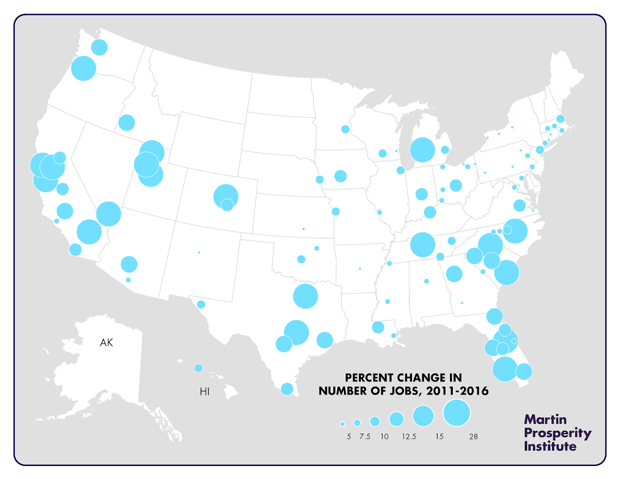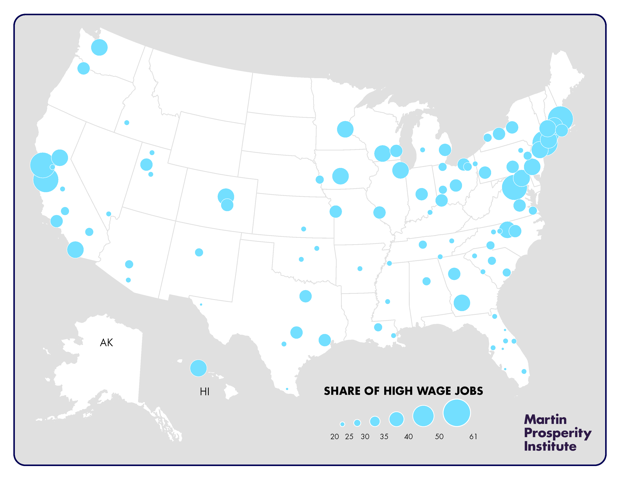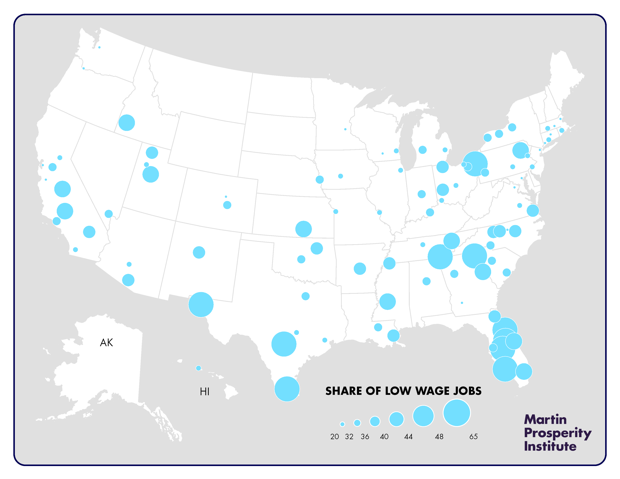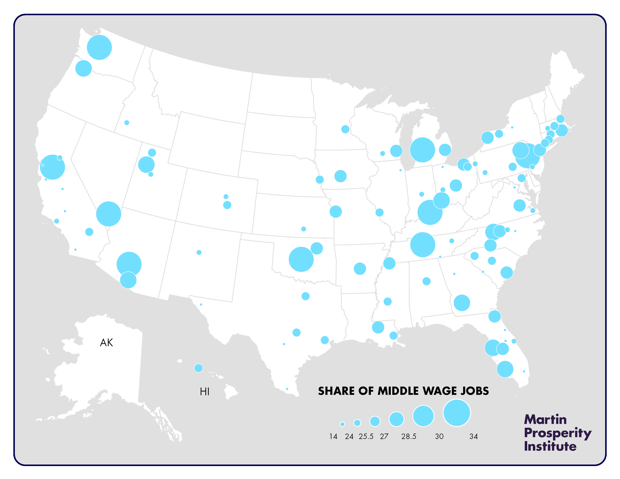Connecting state and local government leaders
In the U.S., job growth continues to be concentrated in a small number of high-performing metros.
The good news for this Labor Day weekend is that America is producing jobs. The bad news is that lots of them are low-wage jobs, and most of them are concentrated in a relatively small number of metro areas.
Those are the big takeaways from my detailed analysis of the geography of job growth in America’s 100 largest metros between 2011 and 2016, based on data from Josh Wright and his colleagues at the economic data and modeling firm Emsi. Taylor Blake of the Martin Prosperity Institute mapped the data.
The U.S. economy added nearly 12.2 million jobs between 2011 and 2016, growing from about 130 million to more than 140 million jobs, for an overall increase of about 9 percent. The other good news is that high-wage jobs make up the largest number of total jobs, 52.8 million, or 37 percent of the overall U.S. job market.
But low-wage jobs accounted for the largest increase in new jobs between 2011 and 2016, adding 4.5 million jobs, compared to 4.1 million high-wage jobs and 3.5 million mid-wage jobs. Low-wage jobs accounted for 34 percent of jobs in 2016 (a total of 48.2 million jobs), while mid-wage jobs accounted for 29 percent (a total of 40.7 million jobs).
But where exactly are these jobs being created?
Of course, the largest raw number of jobs come from the metros with the largest numbers of people. The New York metro area added more than 740,000 jobs from 2011 to 2016, a nearly 9 percent increase, bringing its job numbers up from 8.3 million to 9 million jobs. Greater Los Angeles added more than 600,000 jobs, an 11.6 percent increase.

When it comes to the highest rates of overall job growth, those metro areas tend to cluster on the coasts, as the map above shows. The largest circles indicate the largest percent increases. Note the large circles in California and the Pacific Northwest on the West Coast, and Florida and the Carolinas on the East Coast, as well as Texas, the Rockies, and parts of the Midwest.
The top ten metros for job growth are a mix of knowledge-based and service-based metros. The tech hub of Provo, Utah, tops the list with a 26.8 percent increase in jobs; Austin (21.9 percent), San Jose (21.3 percent), San Francisco (19 percent), and Raleigh (18.5 percent) also number among the top ten. Cape Coral-Fort Myers (25.8 percent), Orlando (19.6 percent), and North Point-Sarasota (18.9 percent) in Florida and Riverside (19.3 percent) and Stockton (18.2 percent) in California complete the top ten.
Good Jobs / Bad Jobs
But there are good jobs and bad jobs. To get at their geography, we break out three types of jobs based on definitions developed by the National Employment Law Project: high-wage jobs which pay $21.14 per hour or more; mid-wage jobs which pay between $13.84 and $21.13 an hour; and low-wage jobs which pay $13.83 an hour or less. (NELP has since updated their definitions, but we used the 2012 NELP definitions to be consistent with our previous research.)
Here again, we see how uneven job growth has been across the nation. Basically, the same high-performing metros that lead in overall job creation tend to lead in creating all three categories of jobs. Back in 2013, I showed theclose correlation between high- and low-wage job growth across metros, which continues today. The map below shows the job increases in high-, mid-,and low-wage jobs across America’s largest metros.

Provo is first in high-wage job growth (26.6 percent), first in mid-wage job growth (29.2 percent) and second in low-wage job growth (25.6 percent). That said, tech hubs tend to lead in high-wage job growth with San Jose second (23.4 percent), Austin third (21.4 percent) and San Francisco fourth (21 percent). Cape Coral is fifth in high-wage job growth (20 percent) but second in mid-wage job growth (27.4 percent) and first in low-wage job growth (27.9 percent).
Denver and Charlotte have also seen considerable growth in high-wage jobs, while Nashville and Grand Rapids have seen considerable growth in mid-wage jobs. Orlando, North Point-Sarasota, and Riverside have seen considerable growth in low- and mid-wage jobs.
Growth is good, but what’s the share of good jobs and bad jobs?
The next three maps provide an even better angle on the good jobs / bad jobs question, charting the share of high-wage, mid-wage and low-wage jobs within metro areas.

The map above charts the share of high-wage jobs by metro. Now we see the familiar pattern of the Bay Area and the Boston-New York-Washington Corridor, as leading tech and knowledge hubs rise to the very top of the list.
San Jose is first, where high-wage jobs have accounted for more than 60 percent of jobs, followed by Washington, D.C. (57.1 percent), San Francisco (54.7 percent), Bridgeport-Stamford (51.2 percent), Boston (50.6 percent), Seattle (48.3 percent), New York (46.6 percent), Hartford (46.5 percent), Minneapolis-St. Paul (45.8 percent), and Denver (45.2 percent).

The pattern is quite different for low-wage jobs. It is in fact largely the inverse of the high-wage map. The biggest circles indicating the largest concentrations of low-wage jobs are in the South and some parts of the Rustbelt, with much smaller circles in the Bay Area or across the Bos-Wash Corridor.
McAllen, Texas, has the largest share of low-wage jobs, with nearly 65 percent of its jobs falling into this category. El Paso (58.4 percent) and San Antonio (48.7 percent) in Texas also have large concentrations of low-wage jobs, as do Deltona-Daytona Beach Florida (56.3 percent), Orlando (49.8 percent), Lakeland (49.7 percent), North Point-Sarasota (49.0 percent) and Cape Cora, Florida (48.1 percent). The hard-hit Rustbelt metro of Youngstown, Ohio (49.9 percent) also numbers among the ten metros with the largest share of low-wage jobs.

The above map shows the share of middle-wage jobs. There are smaller circles across the board, indicating the now well-known story of the decline of these once family-supporting middle-wage jobs.
Here again we see a mix of mainly Rustbelt and Sunbelt metros. Allentown, Pennsylvania, has the largest share of mid-wage jobs (33.2 percent).
Other metros in this mid-wage group include Grand Rapids (32.1 percent), Albany, New York (29.9 percent), Las Vegas (32.5 percent), Nashville (32.4 percent), Phoenix (30.8 percent), Oklahoma City (30.7 percent) and Louisville (30.6 percent), along with Seattle (30.7 percent) and Stockton, California (30.1 percent).
Taken together, these maps provide a stark picture of America’s economic recovery. The recovery has been not so much jobless, but rather it remains divided into a small group of winners and a larger group of losers when it comes to jobs. The small group of winners—mainly knowledge and tech hubs but also some service-oriented metros—have accounted for the bulk of job growth overall and for high-wage, mid-wage, and low-wage jobs.
Even more troubling, knowledge and tech hubs dominate when it comes to the share of job growth made up of high-wage jobs, which is strongly concentrated in the Bay Area, the Boston-New York-Washington Corridor and other talent hubs such as Seattle, Denver, the Twin Cities and Austin. If anything, America’s jobs divide has become even more pronounced in the past several years, with the gaps between a dozen or so big winners and the rest growing ever larger. America is not only beset by rising income inequality, it faces deepening regional inequality in jobs, wages, and opportunity as well.
Richard Florida is a co-founder and editor at large of CityLab, where this article was originally published.

NEXT STORY: How to Keep Key Talent Attracted to State Workforces



